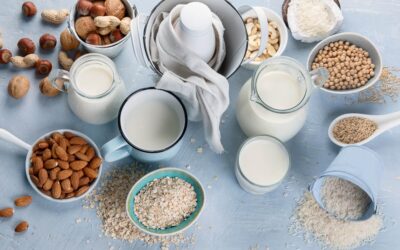What is a2 milk?
A2 milk is milk from mother dairy cows that have been bred to not produce the A1 beta-casein protein—a form of the casein protein in milk. This type of cow’s milk exists because producers of a2 milk claim that this A1 protein causes stomach discomfort and bloating. However, a2 milk is still problematic. Keep reading to find out more.
Is a2 milk suited for people with a dairy allergy or lactose intolerance?
A2 milk still contains the A2 beta-casein protein and whey protein. If someone with a dairy allergy were to ingest either of these proteins, their body will elicit an immune response and cause an allergic reaction, making a2 milk an unacceptable and dangerous alternative. Even the a2 Milk® company admits that their milk is not safe for those who are allergic to cow’s milk.
Not sure if you have a dairy allergy? Click here to read 4 Unexpected Signs You May be Allergic to Dairy by one of our Switch4Good experts, Dr. Vivian Chen. You might be surprised by some of the delayed and discreet symptoms such as respiratory problems, joint pain, weight gain, and more.
In addition to not being suitable for dairy allergy sufferers, a2 milk may also cause side effects for those who are lactose intolerant—the same population this milk is marketed toward. While a2 milk does not contain the A1 protein (thanks to selective breeding), it does contain lactose sugars. Those with lactose intolerance (a whopping 65 percent of the world population) cannot properly digest these sugars, resulting in equally uncomfortable symptoms. A2 milk is looking a lot like “regular” cow’s milk—it’s just a marketing scheme.
a2 milk vs lactose-free milk
Lactose-free milk and a2 milk are somewhat different but promote the same marketing message: consumers can “enjoy” their dairy without annoying stomach discomfort. Lactose-free milk focuses solely on the elimination of lactose sugars but still retains all of the casein and whey proteins. A2 milk focuses solely on eliminating the A1 beta-casein protein while retaining the A2 beta-casein protein, whey protein, and lactose sugar.
Sixty-five percent of the global population is lactose intolerant, which presents a major issue to the dairy industry. Lactose-free milk is the industry’s response. To make cow’s milk more digestible to this large demographic, producers add a lactase enzyme (the same enzyme that is missing from those who are lactose intolerant) to the milk. Adding this enzyme causes a breakdown of the lactose sugars preventing whole, intact sugars from being absorbed by the body.
As we age, the activity of our lactase enzyme—the enzyme that breaks down lactose—begins to decrease. If we are not properly breaking down these lactose sugars, they will get absorbed by the colon fully intact, causing an array of gastrointestinal symptoms such as gas, bloating, and diarrhea. Click here to learn more about this pathway from a Switch4Good expert.
Wondering if you may be lactose intolerant? Take our Lactose Intolerant Quiz.

Is a2 milk healthy if I’m not allergic or lactose intolerant?
While a2 milk and lactose-free milk producers market themselves as a safe alternative for those who do not want to give up their favorite dairy products, these beverages are still cow’s breast milk. Aside from allergies and intolerances, all forms of cow’s milk contain trans fats, saturated fats, a multitude of growth and sex hormones, cholesterol, and foreign sugars—all of which are specifically formulated to help a calf grow into a 2,000 lbs animal. When humans consume this breast milk made for baby cows, these “ingredients” can increase their risk of acne, diabetes, osteoporosis, bone fractures, heart disease, asthma, weight gain, chronic inflammation, and cancer.
To learn more about the potential health risks associated with dairy consumption, visit our Why Ditch Dairy page.
While modified milks may alleviate some gastrointestinal discomfort, one must ask themselves if they really want to be drinking something that requires so much modification before it can be safe for immediate consumption. With so many allergen-free and naturally lactose-free brands of plant milk, there’s no need to skip that cup or coffee or forgo your morning cereal.
What are healthier alternatives to milk?
There are so many different plant milk options, and each has their own benefits and nutritional profile. Check out our “17 Different Plant Milks You Need to Try” article to learn more and find your favorite non-dairy milk.








